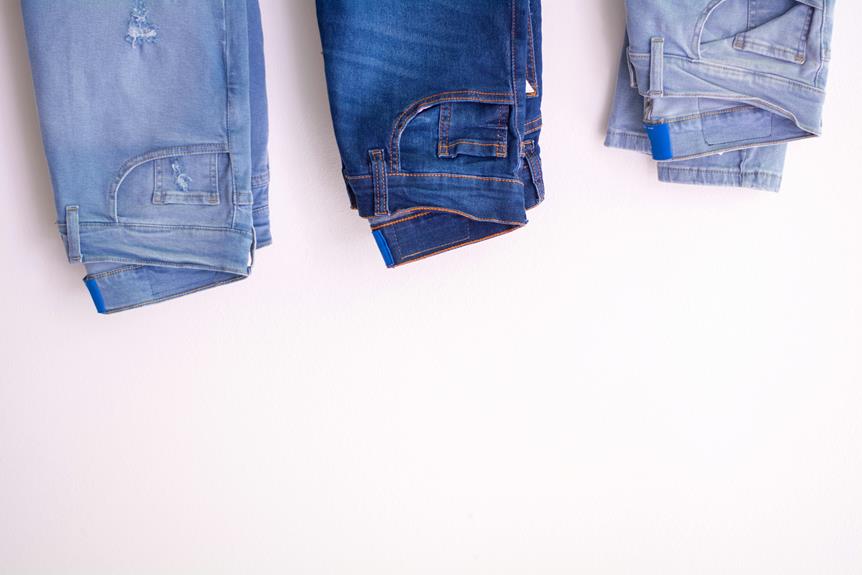When you're considering fabric options for baby clothes, you might wonder if ring spun cotton is a suitable choice. Its softness and durability can be appealing for delicate skin, but there are other aspects to think about before making a decision. For instance, how does it compare with other common materials used in infant apparel? You might find yourself questioning more than just comfort, and the answers could significantly influence your purchase choices. Let's explore what sets ring spun cotton apart and uncover whether it's truly the best option for your little one's wardrobe.
Table of Contents
What Is Ring Spun Cotton?
Ring spun cotton is typically made by twisting and thinning the cotton fibers, which gives it a softer feel and greater durability. This process involves spinning the fibers tightly together, resulting in a tighter and finer yarn. Consequently, the fabric produced from ring spun cotton isn't only smoother but also more durable than traditional cotton.
When you wear or use products made from ring spun cotton, you'll likely notice its luxurious touch against your skin. Because the fibers are elongated and twisted tightly, the fabric feels less coarse than standard cotton varieties. This makes it an excellent choice for various clothing items, especially those worn close to the skin.
In terms of production, the process of creating ring spun cotton can be more labor-intensive compared to carded cotton. The result, however, is worth it, as you get a textile that's well-suited for many applications, ranging from casual wear to higher-end garments.
Benefits of Ring Spun Cotton
Using ring spun cotton offers numerous benefits, including superior softness and increased durability, making it an ideal choice for comfortable clothing.
When you choose this material, you'll enjoy several key advantages that enhance your experience. Here's what you can expect:
- Exceptional Softness: The spinning process makes ring spun cotton incredibly soft against the skin, perfect for delicate baby clothing.
- Enhanced Durability: This type of cotton has a refined structure, resulting in stronger fibers that resist wear and tear, extending the life of garments.
- Better Moisture Absorption: Ring spun cotton effectively wicks away moisture, keeping you or your baby dry and comfortable throughout the day.
- Reduced Pilling: With tightly spun fibers, clothing made from ring spun cotton is less likely to pill, ensuring a smoother, cleaner look over time.
Considerations for Baby Clothing
When choosing fabric for baby clothes, it's essential to prioritize materials that are gentle on sensitive skin while offering durability and comfort.
Babies have delicate skin that can easily react to coarse or harsh fabrics, so you want to look for something soft and breathable. Natural fibers, like cotton, are often preferred because they allow for air circulation and help regulate temperature.
You should also consider how easy the clothing is to put on and take off. Features like stretchy necklines, snap closures, or zippers can make dressing your baby much simpler.
Look for tags that indicate the clothing is free from harmful chemicals, as babies are more vulnerable to irritants.
Another factor to keep in mind is the ease of washing. Babies can be messy, so you'll want fabrics that can withstand frequent washing without losing their shape or softness.
Lastly, pay attention to the fit. Clothes that are too tight can cause discomfort, while those that are too loose might be a safety hazard.
Always keep style and practicality in mind to ensure your little one is comfortable and safe.
Comparing Fabrics for Babies
Many parents wonder how different fabrics stack up when selecting the best option for their baby's clothing. With so many choices available, it's essential to know what each fabric offers and how it impacts your little one's comfort and health.
Here's a quick comparison of four popular fabrics for baby clothes:
- Cotton: Soft, breathable, and hypoallergenic, cotton is a top choice. It's gentle on delicate skin and helps regulate temperature, keeping your baby comfortable.
- Bamboo: Known for its natural antibacterial properties, bamboo fabric is also incredibly soft. It wicks moisture away, making it great for warmer weather.
- Polyester: While durable and resistant to wrinkles, polyester can irritate sensitive skin and isn't as breathable as natural fibers, which can lead to overheating.
- Wool: Excellent for colder climates, wool offers insulation. However, it can be itchy for some babies, so it's best used in blends or as a layer.
Understanding these differences helps you choose the fabric that best supports your baby's needs while keeping them cozy and protected.
Care Instructions for Ring Spun Cotton
Caring for ring spun cotton baby clothes is straightforward, ensuring they stay soft and comfortable against your baby's skin. By following a few simple guidelines, you can maintain their quality and prolong their lifespan.
Here's a handy care guide:
| Washing | Drying | Ironing |
|---|---|---|
| Use cold water settings. | Tumble dry on low. | If needed, use low heat. |
| Wash with similar colors. | Remove promptly to prevent wrinkles. | Avoid direct contact with fabric. |
| Use gentle detergent. | Hang dry to maintain softness. | Iron inside out for best results. |
After washing, always check labels for specific instructions, but ring spun cotton generally handles well. Avoid bleach, which can damage the fibers. If you choose to iron, ensure your iron is set to the appropriate temperature to prevent scorching.
Frequently Asked Questions
Is Ring Spun Cotton Biodegradable and Environmentally Friendly?
Yes, ring spun cotton is biodegradable and environmentally friendly. When you choose it, you're opting for a softer, more durable fabric that breaks down naturally over time, helping to reduce your ecological footprint.
Does Ring Spun Cotton Cause Allergies in Babies?
Ring spun cotton is generally hypoallergenic, making it unlikely to cause allergies in babies. However, every child is unique, so observing any reactions when introducing new fabrics is essential for ensuring their comfort and safety.
Can Ring Spun Cotton Shrink After Washing?
Yes, ring spun cotton can shrink after washing, especially if you use high heat. To avoid this, you should wash it in cold water and tumble dry on low to maintain its size and softness.
What Is the Lifespan of Ring Spun Cotton Baby Clothes?
The lifespan of ring spun cotton baby clothes typically lasts several years with proper care. You'll want to wash them gently and avoid harsh detergents to maintain their softness and durability for your little one.
Are There Any Specific Certifications for Ring Spun Cotton Baby Clothing?
Yes, there are certifications for ring spun cotton baby clothing. Look for labels like GOTS or OEKO-TEX, which ensure the fabric meets strict safety and environmental standards. Your baby's skin deserves the best care possible!
- How Does Ring Spun Cotton Affect Garment Fit and Shape Retention? - August 13, 2024
- What Are the Challenges in Producing Ring Spun Cotton? - August 13, 2024
- Is Ring Spun Cotton Suitable for Plus-Size Clothing? - August 13, 2024



